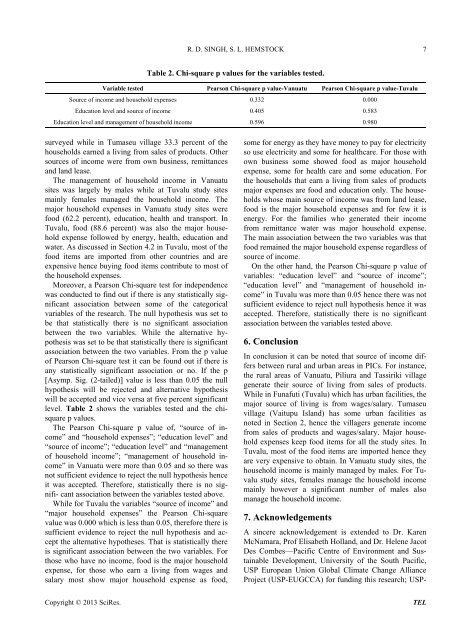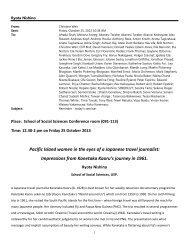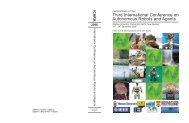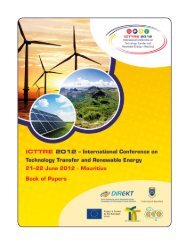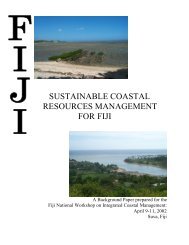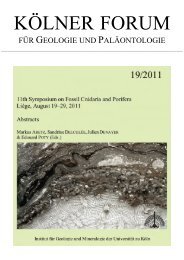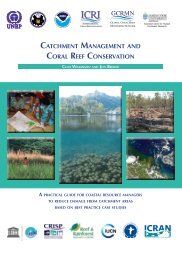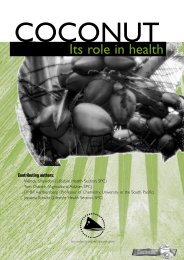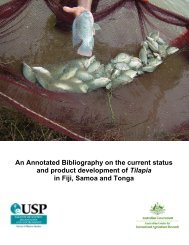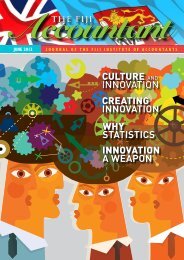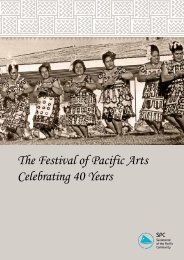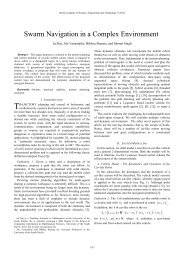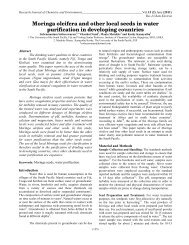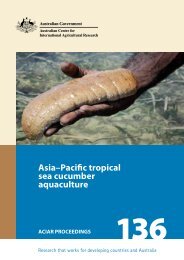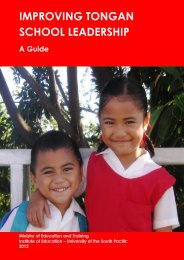Full-Text PDF - Scientific Research Publish
Full-Text PDF - Scientific Research Publish
Full-Text PDF - Scientific Research Publish
Create successful ePaper yourself
Turn your PDF publications into a flip-book with our unique Google optimized e-Paper software.
R. D. SINGH, S. L. HEMSTOCK<br />
7<br />
Table 2. Chi-square p values for the variables tested.<br />
Variable tested Pearson Chi-square p value-Vanuatu Pearson Chi-square p value-Tuvalu<br />
Source of income and household expenses 0.332 0.000<br />
Education level and source of income 0.405 0.583<br />
Education level and management of household income 0.596 0.980<br />
surveyed while in Tumaseu village 33.3 percent of the<br />
households earned a living from sales of products. Other<br />
sources of income were from own business, remittances<br />
and land lease.<br />
The management of household income in Vanuatu<br />
sites was largely by males while at Tuvalu study sites<br />
mainly females managed the household income. The<br />
major household expenses in Vanuatu study sites were<br />
food (62.2 percent), education, health and transport. In<br />
Tuvalu, food (88.6 percent) was also the major household<br />
expense followed by energy, health, education and<br />
water. As discussed in Section 4.2 in Tuvalu, most of the<br />
food items are imported from other countries and are<br />
expensive hence buying food items contribute to most of<br />
the household expenses.<br />
Moreover, a Pearson Chi-square test for independence<br />
was conducted to find out if there is any statistically significant<br />
association between some of the categorical<br />
variables of the research. The null hypothesis was set to<br />
be that statistically there is no significant association<br />
between the two variables. While the alternative hypothesis<br />
was set to be that statistically there is significant<br />
association between the two variables. From the p value<br />
of Pearson Chi-square test it can be found out if there is<br />
any statistically significant association or no. If the p<br />
[Asymp. Sig. (2-tailed)] value is less than 0.05 the null<br />
hypothesis will be rejected and alternative hypothesis<br />
will be accepted and vice versa at five percent significant<br />
level. Table 2 shows the variables tested and the chisquare<br />
p values.<br />
The Pearson Chi-square p value of, “source of income”<br />
and “household expenses”; “education level” and<br />
“source of income”; “education level” and “management<br />
of household income”; “management of household income”<br />
in Vanuatu were more than 0.05 and so there was<br />
not sufficient evidence to reject the null hypothesis hence<br />
it was accepted. Therefore, statistically there is no signifi-<br />
cant association between the variables tested above.<br />
While for Tuvalu the variables “source of income” and<br />
“major household expenses” the Pearson Chi-square<br />
value was 0.000 which is less than 0.05, therefore there is<br />
sufficient evidence to reject the null hypothesis and accept<br />
the alternative hypotheses. That is statistically there<br />
is significant association between the two variables. For<br />
those who have no income, food is the major household<br />
expense, for those who earn a living from wages and<br />
salary most show major household expense as food,<br />
some for energy as they have money to pay for electricity<br />
so use electricity and some for healthcare. For those with<br />
own business some showed food as major household<br />
expense, some for health care and some education. For<br />
the households that earn a living from sales of products<br />
major expenses are food and education only. The households<br />
whose main source of income was from land lease,<br />
food is the major household expenses and for few it is<br />
energy. For the families who generated their income<br />
from remittance water was major household expense.<br />
The main association between the two variables was that<br />
food remained the major household expense regardless of<br />
source of income.<br />
On the other hand, the Pearson Chi-square p value of<br />
variables: “education level” and “source of income”;<br />
“education level” and “management of household income”<br />
in Tuvalu was more than 0.05 hence there was not<br />
sufficient evidence to reject null hypothesis hence it was<br />
accepted. Therefore, statistically there is no significant<br />
association between the variables tested above.<br />
6. Conclusion<br />
In conclusion it can be noted that source of income differs<br />
between rural and urban areas in PICs. For instance,<br />
the rural areas of Vanuatu, Piliura and Tassiriki village<br />
generate their source of living from sales of products.<br />
While in Funafuti (Tuvalu) which has urban facilities, the<br />
major source of living is from wages/salary. Tumaseu<br />
village (Vaitupu Island) has some urban facilities as<br />
noted in Section 2, hence the villagers generate income<br />
from sales of products and wages/salary. Major household<br />
expenses keep food items for all the study sites. In<br />
Tuvalu, most of the food items are imported hence they<br />
are very expensive to obtain. In Vanuatu study sites, the<br />
household income is mainly managed by males. For Tuvalu<br />
study sites, females manage the household income<br />
mainly however a significant number of males also<br />
manage the household income.<br />
7. Acknowledgements<br />
A sincere acknowledgement is extended to Dr. Karen<br />
McNamara, Prof Elisabeth Holland, and Dr. Helene Jacot<br />
Des Combes—Pacific Centre of Environment and Sustainable<br />
Development, University of the South Pacific,<br />
USP European Union Global Climate Change Alliance<br />
Project (USP-EUGCCA) for funding this research; USP-<br />
Copyright © 2013 SciRes.<br />
TEL


